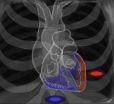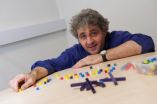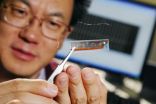Soy may stop prostate cancer spread
Experimental soy-based drug shows benefits in men with localized prostate cancer
2010-11-09
(Press-News.org) CHICAGO --- Northwestern Medicine researchers at the Robert H. Lurie Comprehensive Cancer Center of Northwestern University have found that a new, nontoxic drug made from a chemical in soy could prevent the movement of cancer cells from the prostate to the rest of the body.
These findings will be presented at the Ninth Annual American Association for Cancer Research Frontiers in Cancer Prevention Research Conference.
Genistein, a natural chemical found in soy, is being used in the lab of Raymond Bergan, M.D., the director of experimental therapeutics at the Lurie Cancer Center, to inhibit prostate cancer cells from becoming metastatic and spreading to other parts of the body. So far the cancer therapy drug has worked in preclinical animal studies and now shows benefits in humans with prostate cancer.
A recent phase II randomized study of 38 men with localized prostate cancer found that genistein, when given once a day as a pill, one month prior to surgery, had beneficial effects on prostate cancer cells.
Researchers examined the cancer cells from the subjects' prostates after surgery and found that genistein increased the expression of genes that suppress the invasion of cancer cells and decreased the expression of genes that enhance invasion.
"The first step is to see if the drug has the effect that you want on the cells and the prostate, and the answer is 'yes, it does,'" said Bergan, a professor of hematology and oncology at Northwestern University Feinberg School of Medicine and a physician at Northwestern Memorial Hospital.
The next step is to conduct another phase II study to see if the drug can stop the cancer cells from moving out of the prostate and into the rest of the body, Bergan said. If confirmed, Bergan said this could be the first therapy for any cancer that is non-toxic and targets and inhibits cancer cell movement.
"All therapies designed to stop cancer cell movement that have been tested to date in humans have basically failed have because they have been ineffective or toxic," Bergan said. "If this drug can effectively stop prostate cancer from moving in the body, theoretically, a similar therapy could have the same effect on the cells of other cancers."
INFORMATION: END
ELSE PRESS RELEASES FROM THIS DATE:
2010-11-09
Saying goodbye to summer can be difficult for everybody. In some people the onset of winter triggers Seasonal Affective Disorder, or SAD, a mood disorder in which sufferers experience symptoms of depression. Happily, a special kind of gerbil exhibits remarkably similar reactions to SAD treatments as humans, opening a promising new channel for study and treatment of the common complaint.
With her work on the Israeli desert inhabitant gerbil called the Fat Sand Rat (Psammomys obesus), Prof. Noga Kronfeld-Schor of Tel Aviv University's Department of Zoology and her fellow ...
2010-11-09
New techniques now being used at UCLA allow doctors to more precisely target certain areas of the heart to stop ventricular arrhythmias — serious abnormal rhythms in the heart's lower chambers — in high-risk patients.
Generally, arrhythmias can be controlled by medications, and sometimes defibrillators. But a potentially life-threatening, recurrent arrhythmia known as a ventricular tachycardia, which originates in one of the heart's two ventricles, can produce a fast heart beat that requires other interventions, such as catheter ablation, in which the precise focus ...
2010-11-09
Children with learning difficulties can benefit from being encouraged to find their own way to solve arithmetic problems, according to new research from the University of Strathclyde in Glasgow, Scotland.
A study by Dr Lio Moscardini, in Strathclyde's Faculty of Humanities & Social Sciences, found that children deal better with arithmetical problems if they can use their own intuitive strategies such as using number blocks, drawings or breaking an equation up into smaller, simpler parts- rather than being instructed in arithmetical facts and procedures.
All the teachers ...
2010-11-09
Irvine, Calif., Nov. 8, 2010 — A small amount of bleeding in the brain seems to be common among older individuals, according to a UC Irvine study.
Neurologist Dr. Mark Fisher and neuropathologist Dr. Ronald Kim found that cerebral microbleeds are highly prevalent in the aging brain – and not primarily products of stroke-related injury, hypertension or neurodegenerative diseases such as Alzheimer's, as had been thought.
"Prior work relied on brain imaging to show cerebral microbleeds," Fisher said. "But in this study, deep regions of the brain were closely examined under ...
2010-11-09
AUDIO:
New research that reveals the activity of nerve cells in a songbird's brain as the bird sings a specific song is helping scientists to understand how birds string together sets...
Click here for more information.
A team of scientists has observed the activity of nerve cells in a songbird's brain as it is singing a particular song. Dezhe Jin, an assistant professor in the Department of Physics at Penn State University and one of the study's authors, explained that ...
2010-11-09
Hoboken, NJ – Stevens Institute of Technology and the Netherlands Organization for Applied Scientific Research (TNO) have recently conducted joint experiments in the Dutch Navy Harbor of Den Helder, where passive acoustic systems from both parties were combined. Initial experimental results are presented at the Waterside Security (WSS) 2010 conference. This important experimental campaign was financed by the Netherlands Ministry of Defence.
The collaboration between Stevens and TNO was initiated in early 2010 after recognizing a strategic opportunity to form a long-term ...
2010-11-09
Researchers at the University of California, San Diego School of Medicine and the University of Leeds have linked hundreds of federally approved drugs to more than 1,000 proteins in Mycobacterium tuberculosis, the causative agent of tuberculosis (TB), opening new avenues to repurpose these drugs to treat TB.
The study was published Nov. 4 in PLoS Computational Biology.
"Tuberculosis is currently one of the most widely spread infectious diseases, with an estimated one-third of the world's population infected and between one and two million people dying each year from ...
2010-11-09
WASHINGTON, D.C., November 8, 2010 — A study published in the November edition of Alzheimer's & Dementia: The Journal of the Alzheimer's Association suggests that taking docosahexaenoic acid (DHA) may improve memory and learning in older adults with mild cognitive impairments. This is promising news for many aging Americans who are searching for options to maintain memory and support overall cognitive health.
The "Memory Improvement with Docosahexaenoic Acid Study" (MIDAS) was a randomized, double-blind, placebo-controlled study to evaluate the effects of DHA—the principle ...
2010-11-09
VIDEO:
In the laboratory of Zhong Lin Wang at Georgia Tech, a blinking LCD signals the success of a five-year effort to power conventional electronic devices using nanoscale generators that harvest...
Click here for more information.
Blinking numbers on a liquid-crystal display (LCD) often indicate that a device's clock needs resetting. But in the laboratory of Zhong Lin Wang at Georgia Tech, the blinking number on a small LCD signals the success of a five-year effort ...
2010-11-09
Durham, NC —Many plants can pollinate themselves and reproduce without the aid of a mate, thanks to having both male and female parts. But the short-term perks of being able to go it alone come with long-term costs, says a new study in the journal Science. The reason is because plants that can pollinate themselves are more prone to extinction, scientists say.
Flowering plants are incredibly creative when it comes to sex, said co-author Boris Igic, a biologist at the University of Illinois at Chicago. "Plants just can't walk over to potential mates like we do. Many species ...
LAST 30 PRESS RELEASES:
[Press-News.org] Soy may stop prostate cancer spread
Experimental soy-based drug shows benefits in men with localized prostate cancer




